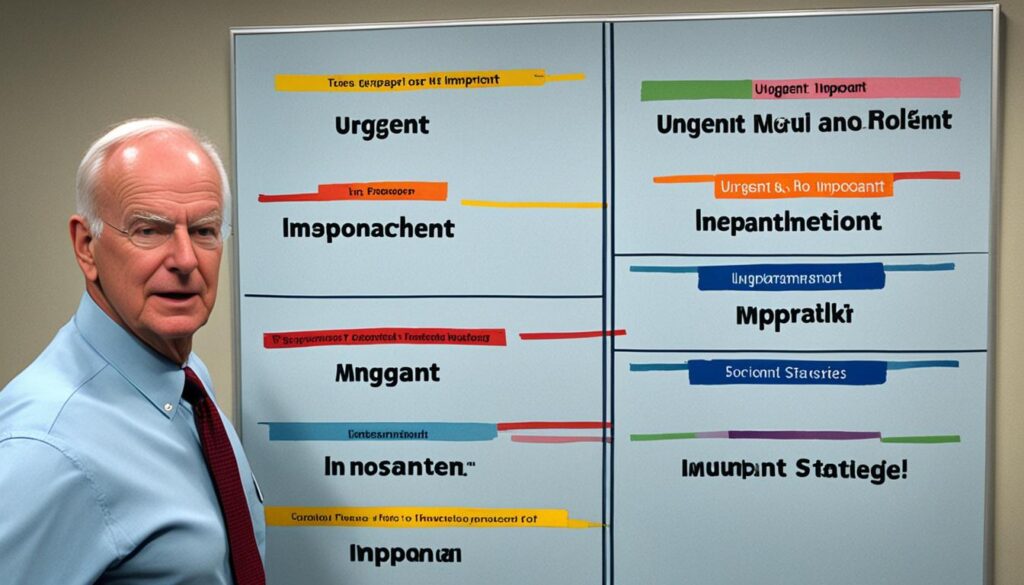Unlock Your Potential with Time Management Mastery

In today’s fast-paced world, finding enough time to accomplish everything on your to-do list can be a constant struggle. But what if there was a way to unlock your full potential and increase your productivity? What if you could achieve more in less time and still have time left for yourself? The answer lies in mastering the art of time management.
Time management is not just about being organized or efficient. It’s about making conscious choices, setting priorities, and optimizing your schedule to align with your goals. By implementing effective time management strategies, you can take control of your time and unleash your true potential.
Key Takeaways:
- Effective time management is crucial for unlocking your potential and achieving your goals.
- Productivity tips, efficient scheduling, prioritization strategies, and time tracking tools can help optimize your time management efforts.
- By mastering the art of time management, you can increase your overall productivity and create a better work-life balance.
- Stay tuned to discover practical strategies and techniques to supercharge your daily productivity and maximize your time.
The Time-Productivity Connection
Time management and productivity go hand in hand. To make the most of your time, it’s crucial to prioritize tasks, eliminate time-wasting activities, and maintain focus and concentration.
When you prioritize tasks, you identify the most important ones that align with your goals for the day. By focusing on these tasks first, you ensure that you’re using your time effectively and efficiently. Prioritization helps you avoid getting overwhelmed and allows you to make progress on tasks that have the greatest impact.
Eliminating time wasters is another key aspect of time management. These are activities that consume your time but don’t contribute to your goals or productivity. Common time wasters include excessive social media use, meetings without clear objectives, and unnecessary multitasking. By identifying and eliminating these time wasters, you free up valuable time to focus on more important tasks.
Focus and concentration are essential for maximizing productivity. When you dedicate focused blocks of time to your most important tasks, you minimize distractions and make significant progress. This can be achieved by creating a conducive work environment, using techniques like time blocking, and using tools and apps to eliminate digital distractions.
Overall, understanding and implementing the connection between time management and productivity can help you optimize your time. By prioritizing tasks, eliminating time wasters, and maintaining focus and concentration, you can make the most of your valuable time and achieve higher levels of productivity.

A Three-Step Approach to Daily Productivity
To supercharge your daily productivity, you can follow a three-step approach:
Step 1: Master Dump
Start your day with a “master dump,” where you jot down everything that needs to be accomplished. This brain dump allows you to declutter your mind and get a clear overview of all your tasks and responsibilities. Write down both big and small tasks, ensuring that nothing slips through the cracks.
Step 2: Prioritize Tasks
After your master dump, it’s time to prioritize your tasks. Take a closer look at your list and identify what needs to be done in the morning and what can wait until the afternoon. Rank your tasks based on urgency, importance, and deadlines. This step helps you focus on the most crucial items first and ensures that you allocate your time effectively.
Step 3: Time Stamping
Now that you’ve prioritized your tasks, it’s time to assign specific time slots to each one. Use time stamping to schedule your tasks throughout the day, allocating dedicated blocks of time for each item on your list. This method helps you create a structured timeline and provides a clear plan for tackling your tasks efficiently. Stick to your schedule as much as possible, but be flexible to accommodate unexpected changes or urgent matters that may arise.
By following this three-step approach to daily productivity—master dump, prioritize tasks, and time stamping—you gain clarity, structure, and ownership over your day. It allows you to accomplish more, eliminate procrastination, and stay on top of your responsibilities.

Practical Strategies for Time Management
When it comes to efficient time management, there are several practical strategies that can help you optimize your productivity. By implementing these strategies, you can effectively prioritize tasks, stay focused, and meet deadlines with ease.
Eisenhower Matrix
One valuable tool for organizing tasks is the Eisenhower Matrix. This matrix categorizes tasks into four quadrants based on urgency and importance. By visually mapping out your tasks, you can identify which ones require immediate attention and which can be delegated or postponed.

| Quadrant | Tasks |
|---|---|
| Urgent and Important | These tasks require immediate action and should be your top priority. They have significant consequences if not completed promptly. |
| Important, but Not Urgent | Tasks falling into this quadrant are crucial for long-term goals and personal growth. Schedule dedicated time to work on them and avoid procrastination. |
| Urgent, but Not Important | Tasks in this quadrant are often distractions. Delegate or eliminate them whenever possible to free up your time for more important responsibilities. |
| Not Urgent and Not Important | These tasks have little to no value and should be avoided or minimized as they can consume valuable time without significant results. |
Time Blocking
Another effective strategy is time blocking. By allocating specific time blocks for different types of work, you can ensure focused periods for tasks, meetings, and breaks. This approach enhances productivity by helping you maintain a structured schedule and avoid multitasking.
Prioritization Tools
To keep track of your tasks and deadlines, it’s essential to utilize prioritization tools. You can use digital calendars, project management apps, or simple to-do lists to organize and prioritize your work effectively. These tools provide visibility into your tasks, deadlines, and progress, enabling you to stay on top of your responsibilities.
By incorporating these practical strategies into your time management routine, you can optimize your productivity and make the most of your available time.
Balancing Paid and Non-Paid Time Activities
When it comes to managing your time effectively, finding the right balance between paid and non-paid activities is crucial. In both your personal and professional life, you need to allocate your time wisely to ensure success in both areas.
Paid time activities are the tasks that directly contribute to your income generation and business growth. These activities include prospecting, closing deals, onboarding clients, and managing your finances. Prospecting, for example, involves creating awareness about your products or services and building valuable connections with potential clients.
On the other hand, non-paid time activities are equally important for your overall success. These activities focus on enhancing your skills, delivering impeccable service, effective communication, and streamlining your onboarding process. By dedicating time to these non-paid activities, you invest in the long-term success and growth of your business.
By managing your time efficiently, you can strike the right balance between paid and non-paid activities. This ensures that you allocate enough time to both aspects, maximizing your productivity and achieving your goals.
Now, imagine yourself as a successful entrepreneur who masterfully balances paid and non-paid time activities. You effectively prioritize your tasks, giving adequate attention to both revenue-generating activities and personal development. Your business thrives as you connect with new clients, close deals, and provide exceptional service. At the same time, you invest in your personal growth, continuously improving your skills and refining your business processes.
Balancing Paid and Non-Paid Time Activities
| Paid Time Activities | Non-Paid Time Activities |
|---|---|
| Prospecting | Enhancing product knowledge |
| Closing deals | Delivering impeccable service |
| Onboarding clients | Effective communication |
| Managing finances | Streamlining onboarding processes |
As you can see from the table above, paid time activities and non-paid time activities complement each other and are both essential for your success. By striking the right balance, you ensure the growth and sustainability of your business, while also investing in your personal and professional development.
Now, let’s delve into the personal and professional benefits that effective time management brings. In the next section, we’ll explore how efficient time management reduces stress, enhances productivity, and enables you to achieve a better work-life balance.
Personal and Professional Benefits of Effective Time Management
Effective time management has a profound impact on both your personal and professional life. By implementing strategic techniques, you can unlock a range of benefits that will enhance your well-being and productivity.
Reduced Stress
One of the primary benefits of effective time management is the reduction of stress. By organizing your tasks and priorities, you eliminate last-minute rushes and stressful deadlines. With a well-planned schedule, you can approach your responsibilities with ease, confidence, and a sense of control.
Enhanced Productivity
Efficient time management allows you to accomplish more in less time. By allocating your time strategically, you can focus on high-priority tasks, eliminate distractions, and maintain a steady workflow. This heightened productivity not only helps you achieve your goals but also boosts your confidence and motivates you to take on new challenges.
Work-Life Balance
Effective time management ensures that you have time for both work and personal activities. By managing your time wisely, you create space for leisure, self-care, and meaningful relationships. Achieving a healthy work-life balance is essential for your overall well-being and long-term success.
By implementing time management techniques, you can experience reduced stress, enhanced productivity, and a better work-life balance. Take control of your time, prioritize your tasks, and unlock your full potential.

Final Recap on Implementing Time Management
Implementing effective time management techniques is crucial for maximizing your productivity and achieving your personal and professional goals. By incorporating the following strategies into your daily routine, you can take control of your time, stay focused, and make the most of every day.
1. Plan Your Day
Start each day with a clear plan of tasks and priorities. Take a few minutes in the morning to review your to-do list and identify the most important tasks that need to be accomplished. This will help you stay organized and ensure that you tackle the most critical items first.
2. Minimize Distractions
In today’s digital age, distractions are everywhere. It’s important to identify common distractions and take steps to minimize their impact on your productivity. Turn off notifications on your phone or computer, find a quiet workspace, and use productivity apps or browser extensions to block distracting websites and apps during focused work periods.
3. Learn to Say No
One of the most difficult but essential skills in time management is learning to say no. It’s okay to decline tasks or commitments that don’t align with your goals or priorities. By respectfully saying no to non-essential tasks, you can protect your time and focus on what truly matters.
By implementing these strategies, you can effectively manage your time, increase your productivity, and achieve your personal and professional aspirations.
A visual representation of managing time effectively and achieving productivity
| Benefits of Effective Time Management | Actions |
|---|---|
| Reduced Stress | By planning your day and staying organized, you can reduce the stress of last-minute rushes and missed deadlines. |
| Enhanced Productivity | Minimizing distractions and focusing on important tasks leads to increased productivity and better results. |
| Work-Life Balance | Effective time management allows for dedicated personal time, reducing burnout and improving work-life balance. |
Conclusion
Time management is the key to unlocking your full potential and achieving a better work-life balance. By implementing effective time management techniques into your daily routine, you can optimize how you use your time and increase productivity.
Start by prioritizing your tasks and eliminating time-wasting activities. Use strategies like the Eisenhower Matrix and time blocking to organize your work and allocate focused time for important tasks. Utilize time tracking tools to stay accountable and make adjustments as necessary.
Remember, effective time management isn’t just about getting more work done; it’s about creating space for personal time and activities. By managing your time efficiently, you can reduce stress, enhance productivity, and achieve a better balance between work and life.





